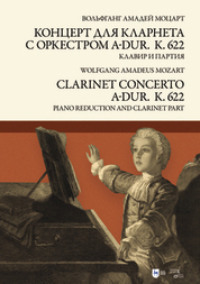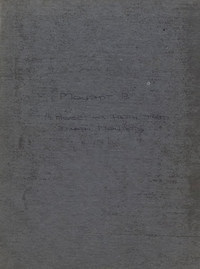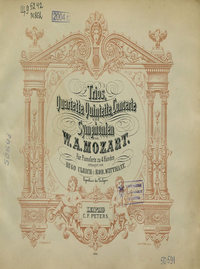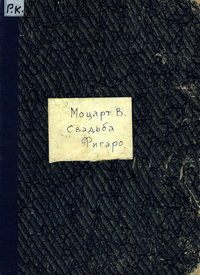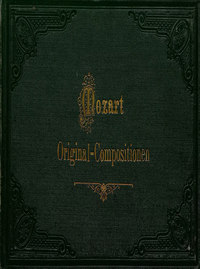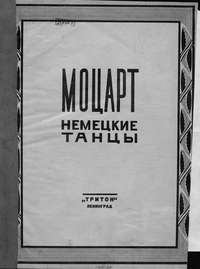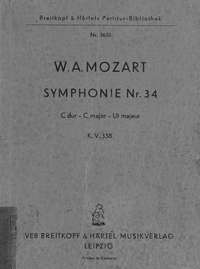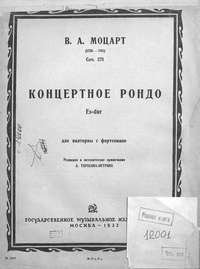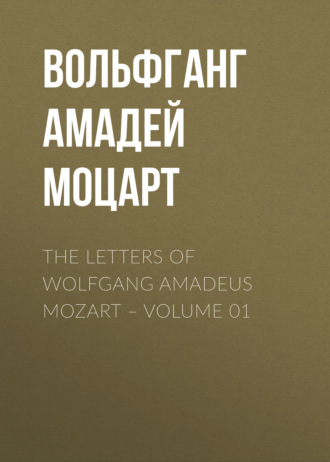 полная версия
полная версияThe Letters of Wolfgang Amadeus Mozart – Volume 01
31.
Venice, Feb. 20, 1771.
I AM still well, and, thank God, in the land of the living. Madame de' Amicis has been singing at S. Benedetto. Say to Herr Johannes that the Widerischen Berlein family are constantly speaking of him (particularly Madlle. Catherine), so he must soon return to Vienna to encounter the attacca—that is, in order to become a true Venetian, you must allow yourself to be bumped down on the ground. They wished to do this to me also, but though seven women tried it, the whole seven together did not succeed in throwing me down. Addio!
The travellers arrived again at home towards the end of March, 1771. The marriage of the Archduke Ferdinand with the Princess of Modena, which took place in the October of that year, was attended with great festivities, and recalled the father and son to Italy in the course of a few months, Wolfgang having received a command from the Empress Maria Theresa to compose a dramatic serenata in honor of these nuptials.
32.
Verona, August 18, 1771.
DEAREST SISTER,—
I have not slept more than half an hour, for I don't like to sleep after eating. You may hope, believe, think, be of opinion, cherish the expectation, desire, imagine, conceive, and confidently suppose, that we are in good health; but I can tell you so to a certainty. Wish Herr von Heffner a happy journey from me, and ask him if he has seen Annamindl?
[Wolfgang, who was then fifteen, had taken advantage of his leisure during their short stay in Salzburg to fall in love for the first time. We shall find frequent allusions to this subject. See also No. 25.]
33.
Milan, August 23, 1771.
MY VERY DEAR SISTER,—
We suffered much from heat in the course of our journey, and the dust constantly dried us up so impertinently that we should have been choked, or died of thirst, if we had not been too sensible for that. For a whole month past (say the Milanese) there has been no rain here; to-day a slight drizzle began, but the sun has now come out again, and it is once more very warm. What you promised me (you well know my meaning, you kind creature!) don't fail to perform, I entreat. I shall be indeed very grateful to you. I am at this moment actually panting from the heat—I tear open my waistcoat! Addio—good-bye!
WOLFGANG.
Above us we have a violinist, below us is another, next to us a singing-master, who gives lessons, and, in the room opposite, a hautboy-player. This is famous for a composer—it inspires so many fine thoughts.
34.
Milan, August 31, 1771.
MY DEAREST SISTER,—
We are quite well, thank God! I have been eating quantities of fine pears, peaches, and melons in your place. My greatest amusement is to talk by signs to the dumb, which I can do to perfection. Herr Hasse [the celebrated opera composer] arrived here yesterday, and to-day we are going to pay him a visit. We only received the book of the Serenata last Thursday. [Footnote: It was "Ascanio in Alba" that Wolfgang got to compose for Milan; and it was this music which made Hasse exclaim, "This boy will cause us all to be forgotten."] I have very little to write about. Do not, I entreat, forget about THE ONE OTHER, where no other can ever be. You understand me, I know.
35.
Milan, Sept. 13, 1771.
DEAR SISTER,—
I write only for writing's sake. It is indeed very inconvenient, because I have a severe cold. Say to Fraulein W. von Molk that I rejoice at the thoughts of Salzburg, in the hope that I may again receive the same kind of present for the minuets which was bestowed on me at a similar concert. She knows all about it.
36.
Milan, Sept. 21, 1771.
I AM well, God be praised! I can't write much. 1st, I have nothing to say. 2d, my fingers ache from writing. I often whistle an air, but no one responds. Only two arias of the Serenata are still wanting, and then it will be finished. I have no longer any fancy for Salzburg; I am afraid I might go mad too. [He had heard that several persons there had lost their reason.]
37.
Milan, Oct. 5, 1771.
I AM in good health, but always sleepy. Papa has snatched from my pen all that I had to write about, which is, that he has already written everything. Signora Gabrielli is here, and we are soon going to see her, as we wish to become acquainted with all distinguished singers.
38.
Milan, Oct. 26, 1771.
MY work being now completed, I have more time to write, but have nothing to say, as papa has written you all I could have said. I am well, thank God! but have no news, except that in the lottery the numbers 35, 59, 60, 61, and 62 have turned up prizes, so if we had selected these we should have won; but as we did not put in at all we neither won nor lost, but only laughed at those who did the latter. The two arias encored in the Serenata were those of Manzuoli, and Girelli, the prima donna, I hope you may be well amused in Triebenbach with shooting, and (weather permitting) with walking.
39.
Milan, Nov. 2, 1771.
Papa says that Herr Kerschbaumer travels with profit and observation, and we can testify that he conducts himself very judiciously; at all events he can give a more satisfactory account of his journey than some of his friends, one of whom said that he could not see Paris properly because the houses there were too high. To-day Hasse's opera is to be given; as papa, however, is not going, I can't go either. [FOOTNOTE: Hasse had also a festal opera to compose, but Leopold Mozart writes, "I am sorry to say that Wolfgang's Serenata has totally eclipsed Hasse's opera."] Fortunately I know all the airs thoroughly by heart, so I can see and hear them in my own thoughts at home.
40.
Milan, Nov. 24, 1771.
DEAREST SISTER,—
Herr Manzuoli, the musico, who has always been considered and esteemed as the best of his class, has in his old age given a proof of his folly and arrogance. He was engaged at the opera for the sum of 500 gigliati (ducats), but as no mention was made in the contract of the Serenata, he demanded 500 ducats more for singing in it, making 1000. The court only sent him 700 and a gold box, (and enough too, I think,) but he returned the 700 ducats and the box, and went away without anything. I don't know what the result of this history will be—a bad one, I fear!
41.
Milan, Nov. 30, 1771.
That you may not suppose I am ill, I write you a few lines. I saw four fellows hanged in the Dom Platz. They hang here just as they do in Lyons.
We now find the father and son once more in Salzburg, in the middle of December, 1771. Archbishop Sigismund died, and on the 14th of March, 1772, Archbishop Hieronymus was elected, who was destined to cause much sorrow to Mozart. Soon after, in honor of the procession and homage of the new prince, he composed the allegorical azione teatrale "Il sogno di Scipione." In October he resumed his travels, having undertaken the scrittura for the approaching Carnivals both at Milan and at Venice.
42.
Bologna, Oct. 28, 1772.
We have got to Botzen already. Already? rather not till now. I am hungry, thirsty, sleepy, and lazy, but I am quite well. We saw the monastery in Hall, and I played the organ there. When you see Nadernannerl, tell her I spoke to Herr Brindl (her lover), and he charged me to give her his regards. I hope that you kept your promise and went last Sunday to D–N–[in cipher]. Farewell! write me some news. Botzen—a pig-sty!
43.
Milan, Nov. 7, 1772.
Don't be startled at seeing my writing instead of papa's. These are the reasons: first, we are at Herr von Oste's, and the Herr Baron Christiani is also here, and they have so much to talk about, that papa cannot possibly find time to write; and, secondly, he is too lazy. We arrived here at 4 o'clock this afternoon, and are both well. All our good friends are in the country or at Mantua, except Herr von Taste and his wife, who send you and my sister their compliments. Herr Misliweczeck [a young composer of operas from Paris] is still here. There is not a word of truth either in the Italian war, which is so eagerly discussed in Germany, or in the castles here being fortified. Forgive my bad writing.
Address your letters direct to us, for it is not the custom here, as in Germany, to carry the letters round; we are obliged to go ourselves to fetch them on post-days. There is nothing new here; we expect news from Salzburg.
Not having a word more to say, I must conclude. Our kind regards to all our friends. We kiss mamma 1,000,000,000 times (I have no room for more noughts); and as for my sister, I would rather embrace her in persona than in imagination.
44.
CARISSIMA SORELLA,—
Spero che voi sarete stata dalla Signora, che voi gia sapete. Vi prego, se la videte di farla un Complimento da parte mia. Spero e non dubito punto che voi starete bene di salute. Mi son scordato di darvi nuova, che abbiamo qui trovato quel Sign. Belardo, ballerina, che abbiamo conosciuto in Haye ed in Amsterdam, quello che attaco colla spada il ballerino, il Sign. Neri, perche credeva che lui fosse cagione che non ebbe la permission di ballar in teatro. Addio, non scordarvi di me, io sono sempre il vostro fidele fratello.
[FOOTNOTE: "DEAREST SISTER,—I hope you have been to see the lady—you know who. I beg that when you see her you will give her my compliments. I hope, and do not doubt, that you are in good health. I forgot to tell you that we found Signor Belardo here, a dancer whom we knew at the Hague and at Amsterdam—the same person who attacked Signor Neri with a sword, because he thought he was the cause of his not obtaining permission to dance in the theatre. Adieu! Do not forget me, always your faithful brother."]
45.
Milan, Nov. 21, 1772.
I thank you exceedingly—you know for what. I cannot possibly write to Herr von Heffner. When you see him, make him read aloud what follows. I hope he will be satisfied with it:—
"I am not to take it amiss that my unworthy friend has not answered my letter; as soon as he has more leisure, he will certainly, beyond all doubt, positively and punctually send me a reply."
46.
Milan, Nov. 28, 1772.
We both send our congratulations to Herr von Aman; tell him from me that, owing to his having all along made a mystery of the affair, I feel much annoyed, for I fear I may have said more than I ought about his bride. I thought he had been more straightforward. One thing more. Say to Herr von Aman that, if he wishes to have a right merry wedding, he must be so kind as to wait till we return, so that what he promised me may come to pass, namely, that I was to dance at his wedding. Tell Herr Leitgeb [a horn-player in the Archbishop's orchestra] that he must come straight to Milan, for he is sure to succeed well here; but he must come soon. Pray let him know this, for I am anxious about it.
47.
Milan, Dec. 5, 1772.
I have now about fourteen pieces to write, and then I shall have finished. [Footnote: He alludes to his Milan opera, "Lucio Silla."] Indeed, the trio and the duet may be considered as four. I cannot possibly write much, for I have no news, and in the next place I scarcely know what I am writing, as all my thoughts are absorbed in my opera, so there is some danger of my writing you a whole aria instead of a letter. I have learned a new game here, called mercanti in fiera. As soon as I come home we can play at it together. I have also learned a new language from Frau von Taste, which is easy to speak, though troublesome to write, but still useful. It is, I own, rather a little childish, but will do capitally for Salzburg. My kind regards to pretty Nandl and to the canary, for these two and yourself are the most innocent creatures in our house. Fischietti [the Archbishop's Capellmeister] will no doubt soon begin to work at his opera buffa (translated into German, his CRAZY opera!). Addio!
The following letter of Wolfgang's shows the sparkling state of his spirits, caused by the completion of his opera. At each line he turns the page, so that one line stands, as it were, on the head of the other. The father, too, in the joy of his heart that the arduous work was drawing to a close, and with it his long journey, writes four lines, one above another, round the edge of the page, so that the whole forms a framework for a sketch of a burning heart and four triangles (symbols of fidelity), and a bird on the wing from whose beak a distich is streaming:—
Oh! fly to seek my child so fair Here, and there, and everywhere!
Wolfgang adds:—
48.
Milan, Dec. 18, 1772.
I HOPE, dear sister, that you are well, dear sister. When this letter reaches you, dear sister, my opera will be in scena, dear sister. Think of me, dear sister, and try, dear sister, to imagine with all your might that my dear sister sees and hears it also. In truth, it is hard to say, as it is now eleven o'clock at night, but I do believe, and don't at all doubt, that in the daytime it is brighter than at Easter. My dear sister, to-morrow we dine with Herr von Mayer; and do you know why? Guess! Because he invited us. The rehearsal to-morrow is to be in the theatre. The impresario, Signor Cassiglioni, has entreated me not to say a word of this to a soul, as all kinds of people would come crowding in, and that we don't wish. So, my child, I beg, my child, that you won't say one syllable to any one on the subject, or too many people would come crowding in, my child. Approposito, do you know the history that occurred here? Well, I will relate it to you. We were going home straight from Count Firmiani's, and when we came into our street we opened our door, and what do you think happened? We went in. Good-bye, my pet. Your unworthy brother (frater),
WOLFGANG.
On the 26th of December "an incomparable performance" of "Lucio Silla" took place; it was eminently successful, and continued to fill the house night after night in the most surprising way. The father writes home regularly, and Wolfgang subjoins the usual postscripts, which, however, at this time contain nothing worth quoting. We give only part of an Italian letter which he writes for practice:—
49.
Vi prego di dire al Sig. Giovanni Hagenauer da parte mia, che non dubiti, che andro a veder sicuramente in quella bottega delle armi, se ci sono quei nomi [?] che lui desidera, e che senza dubbio doppo averlo trovato le portero meco a Salisburgo. Mi dispiace che il Sig. Leitgeb e partito tanto tardi da Salisburgo [see No. 46] che non trovera piu in scena la mia opera e forte non ci trovera nemeno, se non in viaggio.
Hieri sera era la prima prova coi stromenti della seconda opera, ma ho sentito solamente il primo atto, perche a secondo mene andiedi essendo gia tardi. In quest' opera saranno sopra il balco 24 cavalli e . . . mondo di gente, che saro miracolo se non succede qualche disgrazia. La musica mi piace; se piace al replico non so, perche alle prime prove non e lecito l' andarci che alle personne che sono del Teatro. Io spero che domani il mio padre potra uscir di casa. Sta sera fa cativissimo tempo. La Signora Teyber e adesso a Bologna e il carnevale venturo recitera a Turino e l'anno sussiquente poi va a cantare a Napoli.
[Footnote: "Pray say from me to Johannes Hagenauer, that he may entirely rely on my going to the armorer's shop, to see if I can procure what he desires, and after getting it I will not fail to bring it with me to Salzburg. I regret that Herr Leitgeb delayed so long leaving Salzburg [see No. 46], for he will no longer find my opera in scena, nor will he find us either unless we meet on our travels. Yesterday evening was our first rehearsal of the second opera with instruments, but I only heard the first act, for I went away at the second, because it was so very late. In this opera there are to be twenty-four horses and a crowd of people on the stage at the same time, so it will be surprising if no accident happens. The music pleases me; whether it will please others I cannot tell, for no persons but those belonging to the theatre are permitted to attend the first rehearsals. I hope that papa will be able to leave the house to-morrow. The weather is detestable this evening. Madame Teyber is now at Bologna; she is to act at Turin in the ensuing Carnival, and the year following she is to sing at Naples."]
After enjoying some more of the amusements of the Carnival, they arrived again in Salzburg about the middle of March. This place, or rather their position at court there, was in the highest degree repugnant to both; so the father, in the course of his travels, applied to the Grand-Duke of Tuscany for an appointment for his son. As, however, nothing was to be got in that quarter, he directed his views to the Imperial capital itself; and thus, at the end of three months, we find him again with his son in Vienna. From thence Wolfgang often wrote to his loved ones at home.
50.
Vienna, August 14, 1773.
I HOPE that your Majesty [Footnote 1: O. Jahn remarks that this epithet is a reminiscence of a fantastic game that often amused the boy on his journeys. He imagined a kingdom, the inhabitants of which were endowed with every gift that could make them good and happy.] enjoys the best state of health; and yet that now and then—or rather sometimes—or, better still, from time to time—or, still better, qualche volta, as the Italians say—your Majesty will impart to me some of your grave and important thoughts (emanating from that most admirable and solid judgment which, in addition to beauty, your Majesty so eminently possesses; and thus, although in such tender years, my Queen casts into the shade not only the generality of men but even the gray-haired).
P. S. This is a most sensible production.
51.
Vienna, August 21, 1773.
When we contemplate the benefit of time, and yet are not entirely oblivious of the estimation in which we ought to hold the sun, then it is quite certain, Heaven be praised! that I am quite well. My second proposition is of a very different character. Instead of sun, let us put moon, and instead of benefit, science; then any one, gifted with a certain amount of reasoning powers, will at once draw the conclusion that—I am a fool because you are my sister. How is Miss Bimbles? [the dog.] I beg you will convey all sorts of amiable messages from me to her. I also send my kind remembrances to M. Kreibich [conductor of the Imperial chamber-music], whom we knew at Presburg and also at Vienna; and very best regards from Her Majesty the Empress, Frau Fischerin, and Prince Kaunitz. Oidda!
GNAGFLOW TRAZOM.
52.
Vienna, Sept. 15, 1773.
WE are quite well, thank God; on this occasion we have contrived to make time to write to you, although we have so much business to do. We hope you also are well. Dr. Niderl's death grieved us very much. I assure you we cried a good deal, and moaned and groaned. Our kind regards to "Alle gute Geister loben Gott den Herrn" [to all good spirits who praise the Lord], and to all our friends. We graciously remain
Yours, WOLFGANG.
Given from our capital of Vienna.
The travellers returned home the end of September, for no situation was to be found in Vienna either; indeed, they did not even give a public concert there. Wolfgang remained in his native town during the whole of the ensuing year, writing instrumental and church music. At length he received a commission from the Elector of Bavaria, Maximilian III., to write an opera buffa for the Carnival of 1775,—"La finta Giardiniera."
53.
Munich, Dec. 28, 1774.
My Dearest Sister,
I entreat you not to forget, before your journey, [FOOTNOTE: Nannerl had also the most eager desire to see the new opera, and the father at last succeeded in getting a lodging for her in the large market place, in the house of a widow, "a black-eyed brunette," Frau von Durst.] to perform your promise, that is, to make a certain visit. I have my reasons for this. Pray present my kind regards in that quarter, but in the most impressive and tender manner—the most tender; and, oh!–but I need not be in such anxiety on the subject, for I know my sister and her peculiarly loving nature, and I feel quite convinced that she will do all she can to give me pleasure—and from self-interest, too—rather a spiteful hit that! [Nannerl was considered a little selfish by her family.]
54.
Munich, Dec. 30, 1774.
I BEG my compliments to Roxalana, who is to drink tea this evening with the Sultan, All sorts of pretty speeches to Madlle. Mizerl; she must not doubt my love. I have her constantly before my eyes in her fascinating neglige. I have seen many pretty girls here, but not one whose beauty can be compared with hers. Do not forget to bring the variations on Ekart's menuet d'exaude, and also those on Fischer's minuet. I was at the theatre last night. The play was "Der Mode nach der Haushaltung," which was admirably acted. My kind regards to all my friends. I trust that you will not fail to—Farewell! I hope to see you soon in Munich. Frau von Durst sends you her remembrances. Is it true that Hagenauer is become a professor of sculpture in Vienna? Kiss mamma's hand for me, and now I stop for to-day. Wrap yourself up warmly on your journey, I entreat, or else you may chance to pass the fourteen days of your visit in the house, stifling beside a stove, unable once to move. I see the vivid lightning flash, and fear there soon will be a crash!
Your brother.
55.
To HIS MOTHER.
Munich, Jan. 11, 1775.
WE are all three well, Heaven be praised! I cannot possibly write much, for I must go forthwith to the rehearsal. Tomorrow the grand rehearsal takes place, and on the 13th my opera is to be in scena. I am much vexed that you should cast any slight on Count Seeau [Intendant of the Munich Theatre], for no one can be more kind or courteous, and he has more good breeding than many of his degree in Munich. Herr von Molk was in such a state of wonder and admiration at the opera seria when he heard it, that we felt quite ashamed of him, for it clearly showed every one that he had never in his life seen anything but Salzburg and Innspruck. Addio!
56.
To HIS MOTHER.
Munich, Jan. 14, 1775.
GOD be praised! My opera was given yesterday, the 13th, and proved so successful that I cannot possibly describe all the tumult. In the first place, the whole theatre was so crammed that many people were obliged to go away. After each aria there was invariably a tremendous uproar and clapping of hands, and cries of Viva Maestro! Her Serene Highness the Electress and the Dowager (who were opposite me) also called out Bravo! When the opera was over, during the interval when all is usually quiet till the ballet begins, the applause and shouts of Bravo! were renewed; sometimes there was a lull, but only to recommence afresh, and so forth. I afterwards went with papa to a room through which the Elector and the whole court were to pass. I kissed the hands of the Elector and the Electress and the other royalties, who were all very gracious. At an early hour this morning the Prince Bishop of Chiemsee [who had most probably procured the scrittura for his young friend Wolfgang] sent to congratulate me that the opera had proved such a brilliant success in every respect. As to our return home, it is not likely to be soon, nor should mamma wish it, for she must know well what a good thing it is to have a little breathing time. We shall come quite soon enough to–. One most just and undeniable reason is, that my opera is to be given again on Friday next, and I am very necessary at the performance, or it might be difficult to recognize it again. There are very odd ways here. 1000 kisses to Miss Bimberl [the dog].
The Archbishop of Salzburg, who was very reluctant to admit the merits of his Concertmeister, was an involuntary witness of the universal approbation bestowed on Wolfgang's opera, although he would not go to hear it himself. On the 18th of January, 1775, Wolfgang added the following lines to his father's letter:—
57.
MY DEAR SISTER,
[FOOTNOTE: Nannerl had not yet gone home, but was enjoying the Carnival in various masks.]
How can I help the clock choosing at this moment to strike a quarter after seven o'clock? It is not papa's fault either. Mamma will hear all the rest from you. At present there is no fair sailing for me, as the Archbishop is staying here, though not for long. It is currently reported that he is to remain till he sets off again! I only regret that he is not to see the first masked ball.
Your faithful FRANZ v. NASENBLUT.
Milan, May 5, 1756.
Immediately after Ash Wednesday the trio returned to Salzburg, where Mozart remained uninterruptedly for another year and a half, actively engaged in the duties of his situation. He wrote the following letter on the 4th of September, 1776, to the celebrated Pater Martini in Bologna:—


